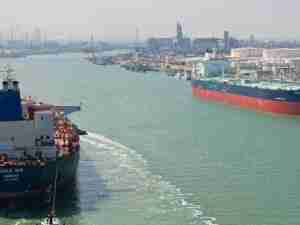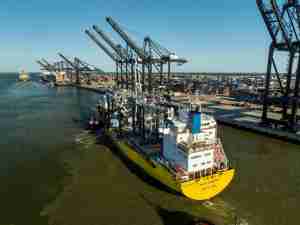Working with a host of other major shippers, as well as ocean and motor carriers and truck manufacturers, plus state and federal governments, Lowe’s is among those at the forefront as CRT’s initiative is extending to include U.S. Southeast ports.
“If the ports are hearing from their biggest customers and they know that adopting these clean trucks programs won’t put them at competitive risk, they are willing to adopt them,” James Jack, executive director of Sacramento, Calif.-based CRT, told the American Journal of Transportation.

“Lowe’s is one spoke in the wheel of large retailers pushing to get these clean trucks on the road,” Jack added. Because Lowe’s is a noteworthy shipper through Southeast ports, the Mooresville, N.C.-based firm is a logical significant participant in CRT’s current focus on state port authorities of Virginia, North Carolina, South Carolina and Georgia.
Dean Tracy, director of import logistics for Lowe’s, said he is hopeful that ports in all four of these Southeast states will have voluntary clean trucks programs implemented by the first quarter of 2011. Next on CRT’s agenda is collaboration with individual ports of Florida, which are not united under a statewide authority, and then additional ports of the Northeast and Gulf regions.
“Who is going to tell us it’s the wrong thing to do?” Tracy asked rhetorically in an interview with AJOT. CRT is collaborating with each of the Southeast authorities on a multistep process to develop clean trucks incentive programs that best suit their ports and customers while meeting pollutant-reduction goals. The steps include establishment of emissions inventories, setting of goals in conjunction with stakeholders and building of consensus. “The ports have really responded well to the fact that we have approached them in a coordinated manner,” Jack said. CRT’s leadership is partnering with the Environmental Defense Fund not-for-profit advocacy group as well in anticipation of stricter federal air quality standards for U.S. ports.
Jack noted that, with public funding scarce, private industry is expecting to bear the brunt of the cost for clean trucks programs. That, however, can be a positive factor, as, according to Jack, the private sector often can meet objectives swifter and at less cost than government.
As an example, Tracy pointed to the success of the PierPASS program, which, since established in 2005, has, through financial incentives, diverted millions of drayage truck trips from peak daytime traffic at the ports of Los Angeles and Long Beach.
Tracy, noting that PierPASS was an alternative to a legislative proposal for a program that would have levied a $60-per-container fee on boxes moved through the Southern California ports, called PierPASS “the shining example” of industry-trade cooperation to resolve an issue “without the intervention of a bureaucracy that might otherwise slow us down.”
CRT, which began in 2007, timed with the development of the first comprehensive emissions-reductions programs at the ports of Los Angeles and Long Beach, also has partnered with the ports of Seattle and Tacoma, the Port of Oakland, and, most recently, the Port Authority of New York and New Jersey, in their respective clean trucks programs. Each program is based upon a model that calls upon shippers to work with licensed motor carriers to establish rates for transition to “green” fleet status, calls upon those carriers to work with truckers to help secure financing and/or downpayment assistance for less-polluting trucks and thus encourages truckers to retire pre-2007 trucks.
In introducing the Southeast initia










